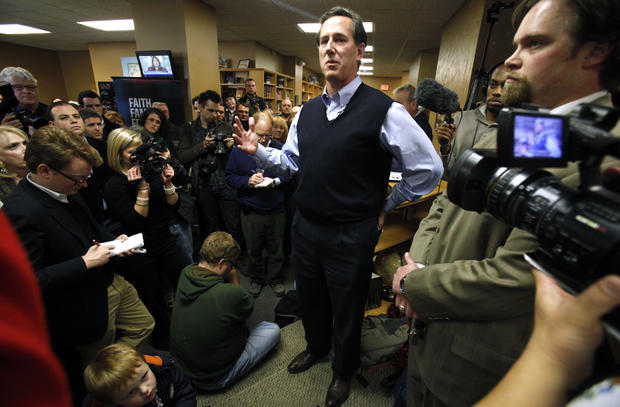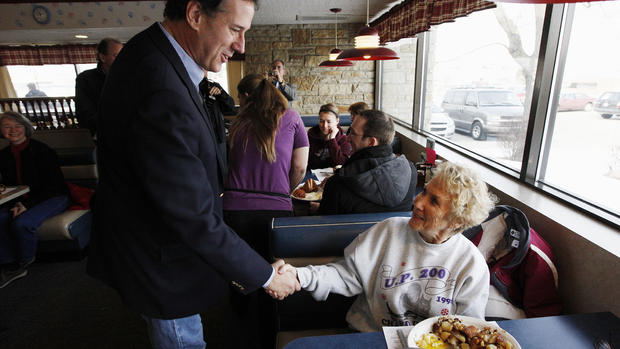Will Rick Santorum win in Iowa?
This post originally appeared on Slate.
DES MOINES, IOWA--Rick Santorum is so hot right now, you'd think he was the cure to something. When pollsters for the Des Moines Register started contacting Republican voters on Tuesday, Santorum was at 10 percent. By Friday when the polling ended, he was at 22 percent, tied for the lead. If they'd kept calling Saturday, voters might have answered the phone singing the senator's name.
When the days were averaged out, which pollsters do to smooth out anomalies, the findings put Romney at 24 percent, Ron Paul at 22 percent, and Santorum at 15 percent. Given the trend, it's possible Santorum could win the caucus on Tuesday, which would be a perfect ending to a volatile race.
The question in Iowa right now is: Are Iowa Republicans finally waking to the wonders of the two-term senator, or is Santorum simply the latest candidate who is not Mitt Romney? Voters have been on a constant rummage through the bin, looking for an alternative. First they moved toward Bachmann, then Perry, Cain, Gingrich, and Paul. Santorum is the last one left.
The answer is probably a combination of the two. Santorum has put himself in a position to take advantage of the moment. He has worked the state harder than any other candidate, visiting all 99 counties and attending 250 events over the last six months. For months he was the Nowhere Man, toiling away and not budging in the polls.
Santorum is also a conviction candidate in a contest that has always been between voters who want an electable candidate (Romney) and voters who want a candidate who shares their conservative values (anyone but Romney). Santorum has talked about social issues in a way that appealed to evangelical voters who now appear to be rallying to him. "The reason I ran is 'cause I think people know there is more than just a little narrow issue called 'jobs,' " he told CBS's Jan Crawford.
Rick Santorum is either Mike Huckabee, who in 2008 won Iowa with 34 percent of the vote, or Pat Robertson, who in 1988* came in second with 25 percent of the vote. Both appealed to social conservatives, but Huckabee expanded the electorate, drawing new voters to the process. On caucus night, longtime participants noticed people showing up they'd never seen before at Republican functions. Those were the Huckabee fans. At the moment, Santorum looks to be inspiring Huckabee-like fervor. In the Register poll, 76 percent of Santorum supporters say they will definitely caucus rather than probably attend, a higher proportion than for any other candidate.
But this enthusiasm may not carry Santorum all the way to a win. So far, the overall number of evangelical voters appears to be down from 2008. But Ann Selzer, the highly respected pollster who runs the Des Moines Register poll, ran the numbers for a Huckabee-like turnout. Under that scenario, Rick Santorum wins with 25 percent, and Mitt Romney is second at 20 percent.
Santorum's rise would seem to contradict a storyline from this year that organization doesn't matter in Iowa. Herman Cain and Newt Gingrich rose to the top of the polls without blanketing the state. The old cliche that you're supposed to work hard and get hot at the end may not be dead, after all. The Register poll shows Iowans have recognized Santorum's hard work. He leads in the categories of "relating to ordinary Iowans" and "least ego-driven"--you'd have to be to endure those months of lonely campaigning. He's also benefitted by avoiding the scrutiny that has battered other candidates. Negative ads about Paul may have been what stopped his rise. (He's slipped in the last days of polling.) Newt Gingrich, once the front-runner, has plummeted after a sustained attack of negative ads. In the latest Des Moines Register poll he is now seen as the most ego-driven, least able to bring about change, least consistent.
Still, Santorum can't count on a strong showing. Nearly every Republican candidate has enjoyed a surge in the 2012 Republican race, except for Mitt Romney, who seems to have a surge protector. At 24 percent he is almost exactly where he was in the June Des Moines Register poll, which he also led with 23 percent. In the October poll he was at 22 percent. His final caucus result in 2008 was 25 percent. The good news for Romney in the poll is that as fervent as the search for an alternative seems to be, voters will be OK if he wins: 78 percent said they would be very enthusiastic or OK with the choice if Romney were the nominee, the highest enthusiasm of the top candidates tested.
And Romney just might win, benefitting from a splintered field. He's working the state hard in the final days, the culmination of a long-planned strategic blow-off of Iowa. Romney didn't participate in the compulsory events of Iowa politics--the Iowa straw poll, the Reagan dinner--and he didn't visit the state much. But his organization from 2008 was largely intact. If he had a late opportunity, the plan was to rush into the state to make a smash and grab at the very end.
Romney is drawing big crowds and finishing on a clear pitch: He's the most electable candidate. In the poll, 48 percent said he was the most electable. (His closest competitor, Newt Gingrich, got only 13 percent.) If Romney wins, it will not only ratify his Iowa strategy and give him a boost going into his stronghold of New Hampshire, but it will ratify his larger cautious strategy, which has been to focus on attacking President Obama and not responding to every challenger who seems momentarily hot.
Political reporters and pros love the Des Moines Register poll that's shown the late edge for Santorum because it accurately predicted the outcome of both the Republican and Democratic races in 2008. We're also all desperate for something to hold on to in this highly speculative last phase. All my phone conversations with sources are all starting to sound the same--inferences about support drawn by crowd sizes (are Santorum's crowds as large as Huckabee's were?) and conjecture about whether this race is like 1980 or 1988 or 1996.
When the conversation stalls we talk about what people universally talk about at stalled points: the weather. How will it affect turnout at the 7 p.m. caucuses? It's supposed to be relatively warm on caucus day, with no precipitation, which one Republican veteran suggested would hurt Ron Paul. His supporters are the most motivated, which means he'd benefit from bad weather. His troops would mount the snowmobiles, whereas the Romney voters might stay home and enjoy a nice fire. (The Register poll contradicted this idea. Only 56 percent of Paul supporters said they would definitely attend the caucus. He no doubt has a tough core following, but as his support has grown, he's also taken on less ardent followers. This explains why he may be losing some support to Santorum.)
With two days until the voting starts, the race is as fluid as anyone can remember, though the 41 percent who told the Des Moines Register they could change their mind is smaller than the nearly 50 percent who said that in 2008. In that election, those last-minute deciders gave Mike Huckabee 34 percent of the vote and dealt a devastating blow to Mitt Romney. That was back when races used to only have one or two surges. 2012 has been a season of surges, but Santorum may have timed his perfectly.
More from Slate:
The 12 Kinds of Undecided Voters
Michele Bachmann: The Iron Lady of Iowa
Newt Gingrich: Mr. Positivity


